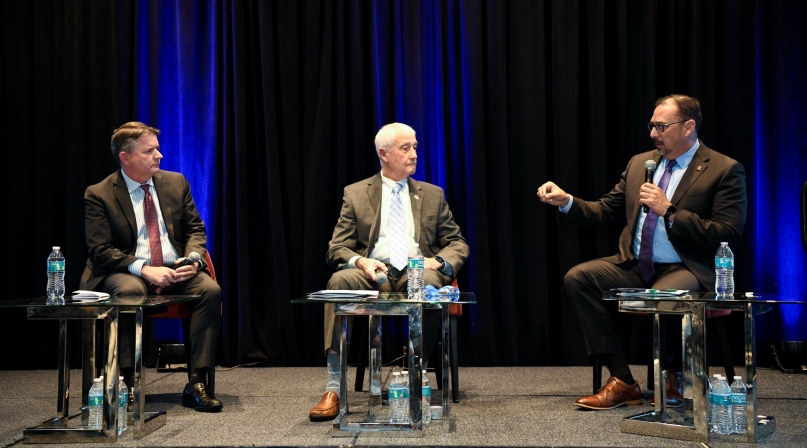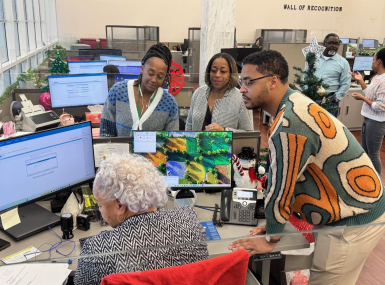Staffing, funding elections remains a challenge

It took broadcast journalist Major Garrett 28 years to recognize the work that goes into elections away from the campaigning and debating.
Despite covering eight presidential elections starting in 1992, “until 2020, I took the part that I just lionized you for legitimately for granted; I just assumed it happened,” he said while speaking at “Counties Ready for 2024: A Summit on Election Administration” on Feb. 12.
Garrett noted that although all educational levels offer political experience in the form of student government elections, the administration of those elections is also an afterthought and doesn’t have the same structure for farming talent.
“There’s no county election clerks club in high school,” he said. “There’s no budding secretary of states club in high school.”
But people who find their way into election administration are often captivated and locked in for the long term, to which U.S. Election Assistance Commissioner Christy McCormick concurred.
“I’ve always said elections are like ‘Hotel California’ — once you check in, you can never check out,” she said.
“It becomes a passion for people once they start working in elections. We’ve seen those in exodus this year, but I think some of those people will come back.”
That may be conditional upon additional protections and resources to enhance election worker safety, given the recent threats faced by many election workers, from leaders down to otherwise anonymous staff.
“We had election workers working 14–16-hour days. They go outside at the end of the day and what were they met with? People with cameras right in their faces, taking pictures of them, videos of them, taking pictures of their license plates,” said Maricopa County, Ariz. Supervisor Bill Gates, who himself has faced public harassment related to baseless claims about the county’s administration of the 2020 election.
“Everyone has the right to ask questions, everyone has the right to protest, but people don’t have the right to intimidate our election workers.”
McCormick said mental health services should be part of a support system for election officials, and pay raises would help retain and recruit election workers.
Those resources may be hard to come by, given the costs of running the basic functions of elections. Arizona Secretary of State Adrian Fontes, a former Maricopa County recorder, noted that election administration remains the only sector in American critical infrastructure without sustained federal funding. Rep. Bryan Steil (R-Wis.) warned counties against wishing too hard for federal or private funding for elections, lest it come with conditions or the appearance of favor.
“I think our best operation is to fund things at the state and local level,” he said. “There is a role for federal government to make investment in particularly large capital expenditure projects,” including voting system technology and cybersecurity.
Steil noted federal election standards could be detrimental to the compartmentalized nature of state-by-state election systems.
“I actually think that the fact that our elections are heterogeneous around the country is actually one of our strengths,” he said.
He drew a comparison to circumstances in which Super Bowl referees were paid by interested parties, rather than the league, and how that would taint any officiating.
“I think that is a really essential piece of the puzzle that we keep the referees neutral,” Steil said. Private funding “gives people less faith and confidence in the operations of the elections.
“I think it actually enhances and helps your job, to maintain your ability to honor and continue to work in a nonpartisan manner in your elections.”
Maricopa County Board of Supervisors Chairman Jack Sellers simplified the proposition.
“If you have any responsibility for running an election, it can’t be about a political party, it can’t be about a person,” he said, “it has to be about voters and if we could just keep that kind of focus, I think it would make life a lot easier.”
Fontes called the election system one of the most important threads in the fabric of our society.
“There’s one golden thread that holds all of those threads together to create the fabric of our society and it is the dependability of our elections — that we get to choose those leaders and those policies that will move us and all of society and sadly, what we’re facing is individuals who are trying to pull that golden thread out. They’re trying to make us lose that civic faith that we have in one another which will ultimately result in the disintegration of the very fabric of our society. So, I would ask folks to consider and reconsider not just why we’re doing this but the spirit behind it, and the reason why our founders decided that we should have a peaceful transfer of power not a transfer by heredity or violence but something that we have for the benefit of all of our society.”
Related News

2024 Clearinghouse Awards: U.S. Election Assistance Commission recognizes county excellence in election administration
The U.S. Election Assistance Commission (EAC) announced the winners of its 2024 Clearinghouse awards, recognizing 32 counties for their election administration practices during the 2024 election cycle.

County Countdown – April 7, 2025
Every other week, NACo's County Countdown reviews top federal policy advocacy items with an eye towards counties and the intergovernmental partnership. This week features a budget reconciliation update, HHS restructuring and more.
Resource
All Elections Are Local: The County Role in the Elections Process


